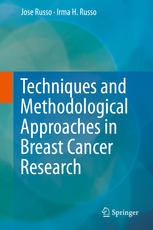

Most ebook files are in PDF format, so you can easily read them using various software such as Foxit Reader or directly on the Google Chrome browser.
Some ebook files are released by publishers in other formats such as .awz, .mobi, .epub, .fb2, etc. You may need to install specific software to read these formats on mobile/PC, such as Calibre.
Please read the tutorial at this link: https://ebookbell.com/faq
We offer FREE conversion to the popular formats you request; however, this may take some time. Therefore, right after payment, please email us, and we will try to provide the service as quickly as possible.
For some exceptional file formats or broken links (if any), please refrain from opening any disputes. Instead, email us first, and we will try to assist within a maximum of 6 hours.
EbookBell Team

4.3
48 reviewsThis volume explores the myriad of techniques and methodological approaches that are being used in breast cancer research. The authors critically evaluate of the advantages and disadvantages of current methodologies, starting with the tools available for understanding the architecture of the human breast, including its tissue and cellular composition. The volume discusses the importance of functional studies in breast cancer research, especially with the help of laser capture microdissection, which allows the separation of small amounts of tissue, as well as specific cells, for biochemical analysis. In addition, the authors address methodologies including stem cell separation, which has helped in significantly understanding their role in normal breast development, but also further the understanding of breast cancer and its therapeutic management. The use of in vitro techniques and established cell lines for mechanistic studies in chemotherapeutic approaches have been invaluable will be discussed. Imaging techniques for evaluating in vitro and in vivo behavior of normal and cancerous breast tissue will be explored, as it provides a better understanding of the physiopathology of cancer. The volume will also discuss the molecular analysis of gene function in breast cancer through the transcriptomic and epigenomic profile. More importantly, the advancement of more refined techniques in sequencing will be covered. This monograph will be a comprehensive, authoritative and timely, as it addresses the emerging approaches used in breast cancer research.